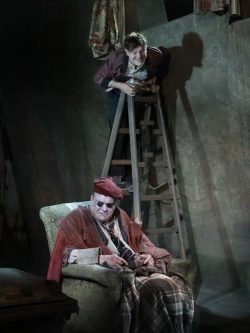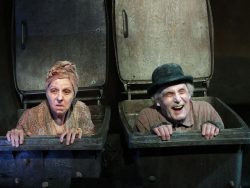 SINCE its first performances in 1957, in French and later in English, Samuel Beckett’s Endgame has been subjected to endless debate, interpretation and controversy, by academics, students, theatre-goers and critics. Regarded by many as the greatest work by the Irish Nobel literature laureate, the play was written while the writer lived in France, where the philosophy of existentialism had been born and developed. Beckett’s works are suffused with awareness of the absurdity of the human condition, and its inevitable ending.
SINCE its first performances in 1957, in French and later in English, Samuel Beckett’s Endgame has been subjected to endless debate, interpretation and controversy, by academics, students, theatre-goers and critics. Regarded by many as the greatest work by the Irish Nobel literature laureate, the play was written while the writer lived in France, where the philosophy of existentialism had been born and developed. Beckett’s works are suffused with awareness of the absurdity of the human condition, and its inevitable ending.
Hundreds of productions of Endgame have been given by companies around the world, and each new one seeks a new perception. A stunning new version, directed by Lindsay Posner, is on stage at Bath’s Ustinov Studio until 4th October, and the audience leaves the intimate space gasping for air and yearning for light. Endgame never loses its imperative message, and that message has never been louder than in these confusing, infuriating and often terrifying times.
Jon Bausor’s set, with its fluorescent, cockeyed frame and inaccessibly high windows, is mired with the grime of decades, its tilting floor making every movement a challenge.
Hamm, blind and paralysed, sits in his chair, centre stage, blowing a whistle to summon Clov, his slave “son”, and to issue instructions. Their dialogue makes a ritual of the repetitive conversations that come with age and isolation. They are not the oldest people in the play. There are two dustbins (modernised to wheelie bins and brought to the forefront in this version) and in them “live” Nagg and Nell, Hamm’s parents. Both are apparently legless. They cannot reach one another to kiss. They reminisce of a glamorous past in Italy.
Beckett was a fanatical chess player, and many link the progress of Endgame to a game of chess. But it doesn’t explain everything. My humble guess it that there are as many interpretations as there are potential moves in a game of chess. “King” Hamm is erudite, witty, dictatorial and wryly self-pitying, trapped as they all are in encroaching filth. Clov, who might be a peasant adopted as a child, has language and thought processes that contradict his background, but a dull and lumpen overview of his wretched and regulated life.
 Douglas Hodge returns to the stage after a ten-year absence to play Hamm, and does so with astonishing relish and versatility, endowing the demanding and difficult man with a sort of anxious, helpless pathos. Mathew Horne, best known as Gavin (with Stacey), brings out the humour urgently needed in this challenging play, regaining a calm determination at the end game.
Douglas Hodge returns to the stage after a ten-year absence to play Hamm, and does so with astonishing relish and versatility, endowing the demanding and difficult man with a sort of anxious, helpless pathos. Mathew Horne, best known as Gavin (with Stacey), brings out the humour urgently needed in this challenging play, regaining a calm determination at the end game.
Clive Francis reveals a death-mask face as he emerges from his bin to cling on to the moments of life left, and Selina Cadell captures a strange charm from her past in her final minutes of misery.
This is an endlessly compelling and thought-provoking play, and I doubt you will ever see a more mesmerising and involving production.
GP-W
Photographs by Simon Annand